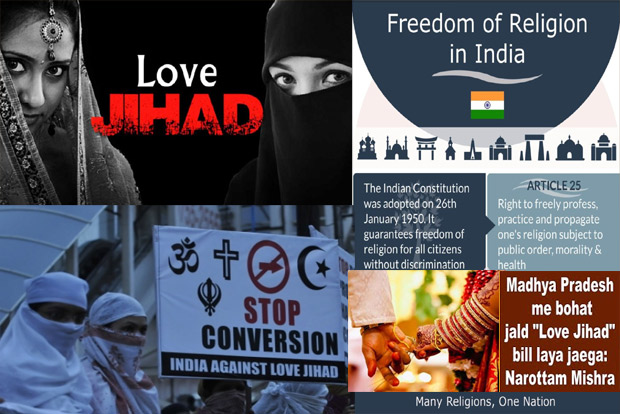Begin typing your search...
Editorial: The love jihad bogey
The announcement by Madhya Pradesh’s Home Minister that the State will bring in a ‘love jihad’ law is extremely disturbing, to say the very least. While the details of the law are not known, the purpose of enacting it is ostensibly to prevent the practice of coercing someone into marriage and then forcibly converting them.

Chennai
Since he made the announcement, Home Minister Narottam Mishra has attempted to distance himself and his government from the use of the expression ‘love jihad’. But the question remains – just what purpose does this law serve and what is behind its making?
The question is pertinent because Madhya Pradesh, like some other Indian States, already has a law under which religious conversions through force, fraud and inducement etc. are illegal. The law survived a legal challenge with the Supreme Court (Stanislaus vs Madhya Pradesh, 1977), maintaining that the constitutional freedom to propagate and practice one’s religion under Article 25 does not imply that one person has a right to convert another. So, if it is prohibited to forcibly convert someone already, what rationale could there possibly be for a new law that covers marriage?
Mishra has since claimed that Madhya Pradesh’s new law will replace its existing anti-conversion law by enhancing punishment and making offences under it non-bailable. But like the anti-conversion law, which is rarely used, but is an instrument that serves, in the eyes of many, to fetter the freedom to propagate one’s religion. Marriage is a contract between consenting adults and it is both dangerous and impractical to expect district officials to determine its validity. If the two people who enter into such a contract declare they did so voluntarily, there is nothing more to be done.
The term ‘love jihad’ is regressive and hopelessly flawed since it is used only to cover cases where men from the religious minorities marry Hindu women. It suggests that there is a deep-seated and widespread conspiracy to promote such marriages, which is a piece of nonsense. The right to marry a person of one’s choice, with his or her consent, is guaranteed under Article 21, which protects life and personal liberty. Any law that risks conflating a consensual inter-faith marriage with a forcible one needs to be opposed strongly.
Madhya Pradesh, of course, is not alone in its matrimonial anxieties. Last year, the Himachal Pradesh State Assembly passed a bill prohibiting conversion by force, which contained clauses against marriages solemnised for the sole purpose of conversion. Haryana is reported to be contemplating such a law and Karnataka Chief Minister BS Yediyurappa has declared his government wants to consider pushing through legislation that prevents religious conversion in the name of “love jihad”. The BJP may be playing to its majoritarian constituency but it is playing a dodgy and discriminatory game.
Visit news.dtnext.in to explore our interactive epaper!
Download the DT Next app for more exciting features!
Click here for iOS
Click here for Android
Next Story



